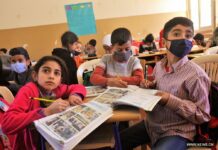
In the wake of the fall of Bashar al-Assad’s regime, Syria is witnessing a significant shift in the refugee crisis, with thousands of Syrians returning home from neighboring countries. The United Nations High Commissioner for Refugees (UNHCR) has emphasized the urgent need for international support and the lifting of sanctions to ensure a sustainable return.
Filippo Grandi, the UN High Commissioner for Refugees, recently visited Damascus and held discussions with Ahmad al-Sharaa, leader of Syria’s Caretaker Government (SCG), on facilitating the return of displaced Syrians. “For returns to be sustainable, investments are needed in security, jobs, housing, and services, for which lifting sanctions will be critical,” Grandi said.
The Road to Return
Since the fall of the Assad regime, approximately 200,000 Syrian refugees have returned home, with intentions to return rising from nearly zero to 30 percent within weeks, according to Grandi. He attributed this shift to improved conditions and a newfound optimism among displaced Syrians.
“Recent developments have created an opportunity to address a long-standing humanitarian crisis,” Grandi added, calling for greater cooperation between the new SCG, donor nations, and neighboring countries to facilitate returns.
The UNHCR reported that nearly 20,100 refugees registered in Jordan have voluntarily returned to Syria since Assad’s fall. Jordan’s Al-Mamlaka TV confirmed that 40 refugee families recently departed Azraq camp under a coordinated effort between the UNHCR and the International Organization for Migration.
Challenges Remain
Despite the growing return trend, challenges remain. William Spindler, UNHCR spokesperson, highlighted that while many Syrians wish to return, they are “waiting for the situation inside Syria to improve.” He noted that about 6 million Syrians are still living in neighboring countries, including Turkey, Lebanon, and Jordan, while another 7 million remain internally displaced.
Spindler stressed the importance of international efforts in rebuilding Syria. “The infrastructure, economic opportunities, and security measures must be strengthened to encourage more people to return,” he said in an interview with Anadolu Agency.
International Calls for Support
The new Syrian administration, led by al-Sharaa, has actively been engaging with international bodies to facilitate the return process. In meetings with the UN Special Envoy to Syria, Geir Pedersen, Syrian officials emphasized the need for an inclusive political process to ensure stability and address the needs of returning citizens.
Pedersen stated that lifting sanctions on Syria would depend on achieving meaningful political progress that satisfies the Syrian people’s aspirations. “There is a consensus that the political process must be comprehensive and representative of all components of Syrian society,” he said.
A New Beginning
As conditions improve, many Syrians are seizing the opportunity to rebuild their lives. Families departing refugee camps have expressed hope for a better future. “We have been waiting for this moment for years,” said a returning refugee at the Jordanian border. “Now, we feel it’s time to go back and rebuild our lives.”
The UNHCR has resumed operations in Syria at 80% capacity to provide returning Syrians with essential support, including housing and healthcare services. However, officials warn that without sustained international aid and the lifting of sanctions, progress may be slow.
Grandi urged donor countries to prioritize Syria’s reconstruction, highlighting the need for a comprehensive plan to support returnees. “We must work together to ensure this return is sustainable and prevents further displacement,” he said.








